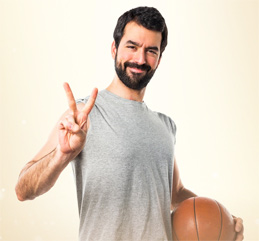
Lasting Victory
Dr. Zev Ballen risked the controversy of the local anti-sports faction to run a basketball clinic for dozens of boys; he taught them more than dribbling a ball…

What’s wrong with competitive sports? Okay, I understand that our Rabbis want us to identify ourselves more with our soul than our body – but the body houses the soul, why not keep it in good working order?
Clearly the problem is not the exercise component of sports (though exercise can be overdone at the expense of developing our spirituality). The main problem is that competitive sports, today, have become a reflection of a sick and competitive society that glorifies “winners” and vilifies “losers” and where the concept of a true victory has been lost.
As someone who was very athletic in my youth, I remember how many good things I learned from participating on sports teams: how sports helped my self-esteem by achieving more than I had achieved before; by learning to accept defeat; by learning to nullify my ego for the greater good of the team. But I also remember how I was taught that winning is everything; that I should have no mercy on my opponent; and that I should be ashamed of myself when I lost.
 This summer, Hashem brought all of this into sharper focus for me when I was asked to run a basketball clinic for 30 boys in my neighborhood from very religious homes. They were mostly Israeli boys who knew very little about sports in general and even less about basketball in particular (which is much less popular in Israel than soccer). I’ll admit to you that I did have some hesitation about participating in this venture. Sometime before I moved here, somebody put a sign up inviting people to join a basketball game, and the sign was torn down sparking a whole controversy in town which didn’t end in a good way.
This summer, Hashem brought all of this into sharper focus for me when I was asked to run a basketball clinic for 30 boys in my neighborhood from very religious homes. They were mostly Israeli boys who knew very little about sports in general and even less about basketball in particular (which is much less popular in Israel than soccer). I’ll admit to you that I did have some hesitation about participating in this venture. Sometime before I moved here, somebody put a sign up inviting people to join a basketball game, and the sign was torn down sparking a whole controversy in town which didn’t end in a good way.
Regardless of the risk of controversy, I really wanted to coach these boys because I welcomed the chance to teach them Torah values in an enjoyable athletic setting. I certainly wasn’t looking to get embroiled in another conflict between the pro-sports and anti-sports factions in my community (where the anti-sports faction was in the majority). Yet, I thought, here I have the opportunity to present these boys with the Torah’s approach to dealing with the challenges of conflict, revenge, competition, victory, defeat, despair – the emotions that sports bring out in people. Since I didn’t think that they were being taught this in yeshiva, I decided to accept the offer.
The first thing that kids need to understand in order to be properly prepared for the competition of sports and life in general, is that the emphasis that the secular world puts on “winning” has very little significance to us. It may feel good for the moment to be the “winner” and to “defeat or destroy” the opponent but this isn’t a healthy outlook according to our Torah perspective. The problem with wanting to win for the sake of winning and trashing your “enemy” (the other team) is that there is nothing permanent about this empty kind of “victory” – sometimes you will be the “victor” and sometimes you’ll be the “vanquished.” And on a deeper level you have done nothing to help unify the world which is our purpose.
In high school, when our team won we were “on top of the world” and when we lost it was understood that there would be no talking on the bus on the way back from the game. It was as though we were sitting shiva (mourning). And for what? A game? We were taught that it was a humiliating disgrace to lose!
What’s a better approach to teach kids? It’s to teach kids how to make a spiritual assessment of how they played the game: “What was my level of effort today?” “To what extent did I experience negative emotions like fear or selfishness or laziness that interfered with my helping my team mates?” “Was I sufficiently humble or did I try to do more than I was capable of doing?” “To what extent did I work together selflessly with others?” “Did I want to play by the rules, or would I have skipped over the rules if I could have?”
The real “winner,” in the Torah view, is the person who is using athletics to build his character and to also make others better than they are. If the only goal of winning is to “beat” the opponent and make him the loser then we end up losing part of ourselves as well. The “competition” should be for everyone to bring out the best in each other and end up more united and less separate than they were before.
The Torah view of victory is called netzach: lasting victory. What is a real victory? It is making your “enemy” your friend. Real victory, lasting victory only comes from the victory of good over evil. In sports this means to that our yetzer tov: our good emotions, intentions, actions, speech and thoughts should prevail over our yetzer hara: our negative thoughts, emotions, actions and speech. The positive inclination can be “defeated” at times, but never permanently because evil has no permanent power. As it says in the Talmud: “Falsehood has no legs.” Falsehood can only “win” temporarily and only in this world (in a very superficial sense of victory). However falsehood has no lasting ability. And certainly in the next world, evil will be “made better”; evil will be turned into good and there will only be goodness and nothing else.
Let’s use sports to teach our kids about the power of goodness and eternity – that’s what we’re really fighting for. If we fight and compete to possess the power of eternity we will also be winners.










Tell us what you think!
Thank you for your comment!
It will be published after approval by the Editor.